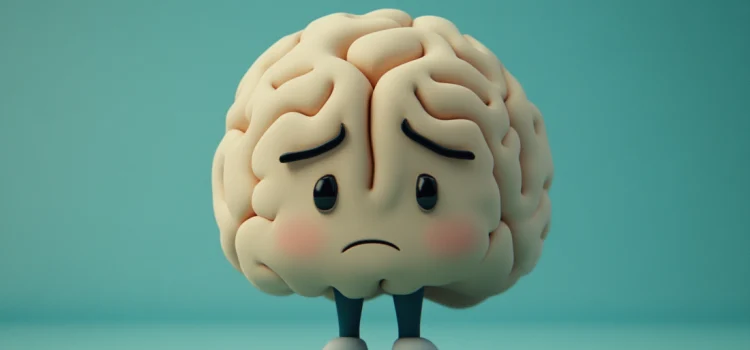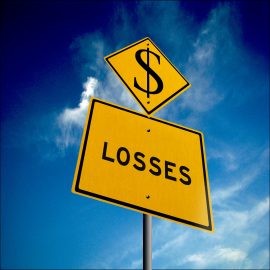
What kind of effect does mental toxicity have on your body? How do unhealthy thoughts lead to mental toxicity and mental illness?
Caroline Leaf says that unhealthy thinking is what causes mental illness in the brain, not deficiencies or abnormalities in your physical brain. She refers to this as mental toxicity.
Let’s look at the process of mental illnesses forming in the brain, from an unhealthy thought to toxic energy.
Understanding Mental Toxicity
We’ll lay some groundwork for understanding mental toxicity by discussing the nature of the mind, the brain, and thoughts. Then, we’ll define mental toxicity and explain what causes mental illness in the brain. Finally, we’ll explore the effects that Leaf says mental toxicity can have on your mind and body.
Your Mind, Your Brain, and Your Thoughts
According to Leaf, your mind and brain are two independent but interconnected entities: The mind is an energetic field that constantly creates, contains, and responds to the interplay of thoughts, emotions, and choices that make up our moment-to-moment existence and identity. In contrast, the brain is a physical structure that enables you to be conscious. It’s not the source of your mental experiences; rather, your mental experiences shape your brain.
Leaf argues that thoughts exist in three forms: as metaphysical energy, as physical structures located in your brain, and as physical structures in your body.
In your brain, physical thoughts consist of vibrating particles of energy in a protein called tubulin found within dendrites (which are parts of brain cells); Leaf uses images of brain cells to illustrate her view that physical thoughts are shaped like trees. In your body, thoughts exist inside cells as cellular memory, which allows you to recall and associate physical experiences with psychological events. For example, if you broke your arm shortly after a breakup, your arm might hurt when you think about your ex. Leaf also says your body cells are irradiated with the energy contained by the thoughts inside your brain.
What Is Mental Toxicity?
Leaf explains that unhealthy thoughts consist of toxic metaphysical energy. If you have too many unhealthy thoughts, then toxic metaphysical energy can accumulate in your mind, causing the mind itself to become toxic (a state of mental toxicity).
Leaf says that since toxic thoughts are physically real, she can measure mental toxicity by evaluating toxic energy patterns in the brain. Physical thoughts generate energy that can be measured with brain mapping technology that detects brainwaves (patterns of electric activity in the brain). This technology reveals either coherence or incoherence in your brain. When your brain is coherent, different parts of your brain demonstrate similar energy patterns; this indicates that your thoughts are primarily healthy. When your brain is incoherent, different parts of your brain produce different patterns of energy; this means that your mind contains more unhealthy thoughts, which indicates mental toxicity.
How Toxic Energy Accumulates in Your Mind and Brain
What causes some people to suffer from mental toxicity? Let’s explore two sources of unhealthy thinking and discuss how a single unhealthy thought can lead to mental toxicity.
Sources of Unhealthy Thinking
Recall that Leaf says mental toxicity occurs when you’re prone to unhealthy thinking patterns. She describes several reasons this might happen. The most common reason, according to Leaf, is that you’ve been exposed to some of life’s harsh realities—for example, you may have experienced a traumatic event like a natural disaster or grief following the loss of a loved one. This may have caused you to think unhealthy thoughts if you didn’t have access to resources—like a mental health professional or a trusted loved one—to help you process those experiences in a healthy way.
Additionally, says Leaf, many unhealthy thought patterns stem from a negative outlook on the future. Some of this can be tied to socioeconomic concerns: For instance, you may obsess over questions like “Do I fit in?” or “Do I make enough money?” Leaf says millennials may be particularly vulnerable to these sources of mental toxicity because they’ve faced unprecedented social and economic challenges, including the advent of social media, which facilitates social comparison, and growing wealth inequality.
How an Unhealthy Thought Leads to Mental Toxicity
Leaf says that unhealthy thoughts travel through three mental planes. These planes are the nonconscious mind, which stores information about your identity as well as thoughts and memories that shape your perspective of the world; the conscious mind, where you actively think and are aware of your thoughts; and the subconscious mind, which uses physical and emotional hints to bring nonconscious thoughts to the conscious mind.
According to Leaf, unhealthy thoughts form in your nonconscious mind. Your subconscious mind likely alerts you to them, but you might ignore these hints (Leaf says many people have a tendency to avoid unhealthy thoughts because acknowledging and working through them is emotionally taxing). When you ignore such hints, you can’t bring an unhealthy thought into your conscious mind for processing. This allows the unhealthy thought to fester in your nonconscious mind: It becomes larger and more powerful because you continue to pour metaphysical energy into it. This pattern can become habitual, leading your nonconscious mind to become full of toxic energy (hence Leaf’s definition of mental toxicity).
To illustrate, say you make a mistake and form the nonconscious thought “I’m stupid.” According to Leaf, you’d likely become aware of that thought via physical or emotional hints provided by your subconscious; for example, your cheeks might flush with shame as you realize your mistake. You may ignore such hints if you don’t have enough emotional bandwidth to deal with them. As a result, the unhealthy thought begins to fester. The next time something happens to make you feel stupid, you pour more metaphysical energy into the thought “I’m stupid,” magnifying it. Over time, if this pattern of thinking becomes habitual, related thoughts like “I’m worthless” could accumulate and intensify, leading to mental toxicity.
The Effects of Mental Toxicity
Leaf says that when toxic energy accumulates in your mind and brain, it has negative mental and physical effects. Let’s explore a few of those.
Psychological Effects of Mental Toxicity
According to Leaf, some of the negative psychological effects of mental toxicity include:
A heightened stress response: Because there are so many unhealthy thoughts lurking in your mind, you’re more reactive to daily challenges and less able to cope with stress effectively. For example, you may feel overwhelmed by minor inconveniences like traffic.
Symptoms of depression and anxiety: Leaf says your unhealthy thoughts can warp your worldview in negative ways. For example, you may feel a pervasive sense of sadness or have persistent fears about various aspects of life.
Difficulty making healthy decisions: Because mental toxicity can cloud judgment and diminish motivation, you may find it difficult to prioritize getting enough sleep, exercise, and nutritious food.
Physical Effects of Mental Toxicity
Leaf suggests that mental toxicity also has several detrimental physical effects, including:
Poor brain health: Recall that according to Leaf, thoughts exist as both metaphysical energy and as physical structures—so mental toxicity can adversely affect the physical structure and function of the brain. As we discussed, Leaf measures this effect using brain mapping technology that measures coherence.
Increased inflammation: Leaf explains that mental toxicity can cause your body to produce and circulate higher levels of the stress hormones cortisol and homocysteine, which can lead to increased inflammation throughout the body. Leaf also says that physical thoughts have structural deformities that can increase inflammation in the brain. Inflammation in the brain and body can contribute to poorer physical and mental health—for example, it makes you more likely to get sick.
Vulnerability to illness: According to Leaf, the vast majority of illness results from mental toxicity. She explains that mental toxicity makes you more vulnerable to three kinds of illness: First, you’re more vulnerable to lifestyle-related diseases like diabetes due to the difficulty you have making healthy choices. Second, the chronic inflammation you suffer as a result of stress makes you more vulnerable to communicable illnesses like viruses. Third, toxic thoughts can unlock genetic predispositions to illness and rapid aging (which we’ll cover next) via a process called epigenetics, where your behaviors and environment influence the expression of certain genes.
Rapid aging: Leaf says her research shows that mental toxicity causes you to age more rapidly by shortening your telomeres (a part of your DNA whose length is correlated with biological age—in other words, how much your cells have deteriorated): Her research suggests that people with more mental toxicity had shorter telomeres than people with less mental toxicity. She also says that addressing mental toxicity lengthens your telomeres.






